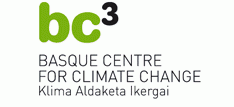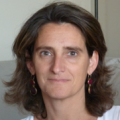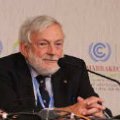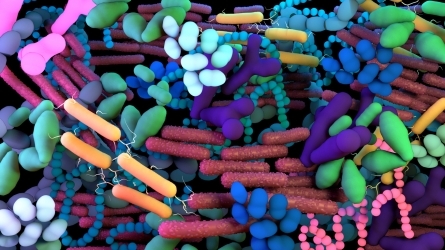Climate Change in an Era of Uncertainty
Descripción
The objective of the BC3-UPV/EHU Summer School is to offer an updated and recent view of the ongoing trends in Climate Change research in an annual basis.
The BC3 Summer School is organized in collaboration with the University of the Basque Country (Fundamentos de Análisis Económico I) and is a high quality and excellent summer course gathering leading experts in the field and students from top universities and research centres worldwide.
Objetivos
Aims:
The objective of the summer school is to offer an updated and recent view of the ongoing trends in Climate Change research in an annual basis. This eighth edition of the Summer School will continue with the multidisciplinary approach and focus on the international climate policy after Paris. As in previous editions, the structure of the school will follow the IPCC (International Panel for Climate Change) general meetings, with two sessions devoted to the subjects of the three IPCC Working Groups: climate science, adaptation and impact and mitigations of climate change. The third day will focus on the key drivers that will make it possible to accelerate the transition towards a low carbon economy. In the previous edition, the course focused on the factors behind the paradigm shift in the international policymaking that were to lead to the Paris Agreement. However, since then many things have happened. The Paris Agreement entered into force on the 4 November 2016. Additionally, the US involvement and participation in the UN Climate process is at risk after the US presidential elections that took place four days later. Meanwhile, time is running out to tackle climate change. Some scientists claim that the Arctic is on track to be free of sea ice in the next decades for the first time in more than 100,000 years. Different speakers will try to cover all the current key issues in climate change such as: artic sea ice, ocean circulation, see level rise, impacts on water, food and health, mitigation options, climate policy and economic instruments for speeding up the transition to a low carbon future. The school is open to PhD Students, postdoctoral fellows and other researchers as well as policy makers interested in acquiring a deep understanding of climate change and the policies designed to fight it. The final aim of this summer school is becoming an integral part of an European Master course offered by the UPV/EHU in a near future.
Observations:
The summer school will encourage the interaction between students, lecturers and the two institutions involved in organising the school. This year we will organise, as previous years, an interactive game for the students (2 day).
Colaboradores
Programa
05-07-2017
“Opening Session“
- María José Sanz Sanchez BC3 Basque Centre for Climate Change - Scientific Director
“A tale of climate change: the caged bird and the golden bull“
- Sergio Henrique Faria BC3 Basque Centre for Climate Change /Ikerbasque - Senior Researcher
“A Farewell to Ice: Arctic climate feedbacks and their global effects“
- Peter Wadhams Cambridge University - Senior Researcher
Pausa
“Climate engineering: May we cure the symptoms of a changing climate?“
- Niemeier Ulrike Max Planck Institute for Meteorology - Senior Researcher
“The new era of the Anthropocene“
- Reinhold Leinfelder Freie Universität Berlin - Senior Researcher
Pausa
Mesa Redonda: ““Geoengineering: part of the solution or part of the problem?”“
- Sergio Henrique Faria BC3 Basque Centre for Climate Change /Ikerbasque - Senior Researcher (Modera)
- Peter Wadhams Cambridge University - Senior Researcher
- Niemeier Ulrike Max Planck Institute for Meteorology - Senior Researcher
- Reinhold Leinfelder Freie Universität Berlin - Senior Researcher
06-07-2017
“Dealing with Uncertainty in Climate Change Adaptation and Mitigation“
- Marc Neumann BC3 Basque Centre for Climate Change - Senior Researcher
“Delineating a Policy Space for Loss and Damage“
- Mechler Reinhard IIASA - Senior Researcher
Break and Poster presentation
“Adapting to Sea Level Rise“
- Iñigo Losada The Environmental Hydraulics Institute "IHCantabria - Director
“Climate change and Sustainable Development Goals“
- Anil Markandya BC3 Basque Centre for Climate Change - Senior Researcher and Former Scientific Director
Mesa Redonda: ““Is our current climate policy-making framework prepared for dealing with uncertainty?”“
- Iñigo Losada The Environmental Hydraulics Institute "IHCantabria - Director
- Anil Markandya BC3 Basque Centre for Climate Change - Senior Researcher and Former Scientific Director
- Mechler Reinhard IIASA - Senior Researcher
“Donostia United Nations Summit“
- Ibon Galarraga Gallastegui BC3 Basque Centre for Climate Change - Senior Researcher
- Marta Escapa Garcia Uiversity of the Basque Country - Teacher
- María José Sanz Sanchez BC3 Basque Centre for Climate Change - Scientific Director
Social event: Cycling tour and "pintxos" night
07-07-2017
“The role of energy in mitigation of climate change“
- Pedro Linares Llamas Universidad de Comillas - Senior Researcher
“Energy transition to a low-carbon economy in Spain 2030/2050“
- Gonzalo Saenz de Miera Asociación Española para la Economía Energética - President
Pausa
“Paris After Trump - the Uncertain Future of International Climate Agreements“
- Christoph Böhringer University of Oldenburg - Senior Researcher
Pausa
Mesa Redonda: ““International climate policy after the 2016 US Presidential elections: With or without US?”“
- María José Sanz Sanchez BC3 Basque Centre for Climate Change - Scientific Director
- Teresa Ribera Rodríguez IDDRI - Director
- Alina Averchenkova London School of Economics - Senior Researcher
“Closing Session“
- María José Sanz Sanchez BC3 Basque Centre for Climate Change - Scientific Director
- Alberto Ansuategi Cobo University of the Basque Country - Teacher
Directoras/es
Investigador senior en BC3 (Basque Center for Climate Change) y profesor asociado de la UPV/EHU. Doctor en Economía (2006, UPV/EHU) y licenciado en Ingeniería (2001, Universidad de Deusto). Ha sido profesor invitado en la Universidad de Wageningen (Holanda) y la Universidad Iberoamericana (México). Sus principales intereses se encuentran en los campos de la economía de la energía y el cambio climático. También está interesado en brindar apoyo científico para la toma de decisiones en la transición hacia una economía sostenible baja en carbono. Su trabajo ha sido publicado en las principales revistas del sector. Ha trabajado para instituciones vascas y españolas y también ha liderado varios proyectos científicos financiados por la Comisión Europea. Su tesis doctoral le valió el premio Enrique Fuentes Quintana (FUNCAS, 2006). Desde 2012 es el coordinador de la línea de investigación Low Carbon en BC3. Actualmente es vicepresidente de la Asociación Española de Economía Energética (AEEE).
Alberto Ansuategi is Doctor of Philosophy (PhD) in Environmental Economics from the University of York (Department of Environmental Economics and Environmental Management). Currently he is a member of the Institute of Public Economics and Associate Professor in the Department of Economic Analysis I, UPV / EHU and Director of the Low Carbon Programme, joint research initiative between the UPV / EHU and the Basque Centre for Climate Change (BC3) and sponsored by the Repsol Foundation. His main research and publications in international journals include contributions to the analysis of the relationship between economic growth and environmental quality, management of fisheries resources and the use of economic instruments to promote energy efficiency and tackling climate change. As for his participation in research projects and networks at European level on issues related to marine economy it should highlighted his participation in the ELME project between 2012 and 2014.
Ponentes
Dr. Alina Averchenkova is a Distinguished Policy Fellow at the Grantham Research Institute at the London School of Economics. She leads Governance and Legislation research theme at the institute. Alina’s most recent work focuses on the implementation of the Paris agreement, in particular the analysis of experiences with climate change governance and legislation around the world and capacity building and advisory to governments and parliaments on the design and implementation of climate and energy laws. Alina has over nineteen years of experience in climate policy and international development. Prior to joining the LSE in 2013, Alina worked for KPMG as Global Director for Climate Change and Carbon; the UN Framework Convention on Climate Change supporting international negotiations on climate change; for a carbon-asset manager First Climate in Zurich and for the Environmental Defence Fund in Washington, DC; Metroeconomica Ltd and for the Russia’s Bureau of Economic Analysis.
Since May 1st, 2012, Prof. Dr. Christoph Böhringer has been a member of the Commission of Experts for Research and Innovation that was established by the German government. Christoph Böhringer is professor for economic policy at the Carl von Ossietzky University in Oldenburg. After his graduation as industrial engineer from the Technical University of Karlsruhe, he received a doctorate in economics at the University of Stuttgart in 1995, where he became head of the section „Energy Economics“ at the Institute for Energy Economics and the Rational Use of Energy (IER). From 1999 to 2006, he led the department „Environmental and Resource Economics, Environmental Management” at the Centre for European Economic Research (ZEW) in Mannheim. In 2002, he habilitated in economics at the University of Regensburg and in 2004 he became professor of economics at the University of Heidelberg.

Marta Escapa Garcia
Associate Professor of Economics, UPV/EHU
Marta Escapa (Ph.D. in Economics, 1996, UPV/EHU) is Associate Professor at the University of the Basque Country (UPV/EHU). Her research and teaching activity has developed in the area of Economic Analysis and, specifically, in Environmental and Resource Economics. She has over 20 years of research and teaching experience that covers both undergraduate and graduate courses on Natural Resource Economics and Environmental Economics and her research has focused on issues like: International Environmental Agreements on Climate Change; Intergenerational Dimension of Climate Change, Economic Analysis of Fisheries Management; Environmental Fiscal Reform and Unemployment; Solid Waste Management using System Dynamics. The main results from this research have been published in peer review journals with impact factor (JCR) like: Journal of Environmental Economics and Management, Environmental and Resource Economics, Energy Economics or Ecological Economics.
S.H. Faria (Dr.rer.nat. Darmstadt University of Technology, Germany, 2003) is Ikerbasque Research Professor at BC3 and Adjoint Presidential Professor at the Nagaoka University of Technology (NUT), Japan. He is Head of the BC3 Research Line “Climate Basis”, Director of the “IzotzaLab” (BC3’s low-temperature research facility), and leader of the Team “Climate Change, Environment and Human Well-Being” within the UPV/EHU Doctorate Programme “Quaternary: Environmental Change and Human Ecological Footprint”. He is also European Coordinator of the “GIGAKU Education Programme for Innovative Global Engineers”, which is part of the “Top Global University Project” of the Japanese Government. He is Associate Editor-in-Chief of Journal of Glaciology and Editorial Board Member of Scientific Reports. He is also Lead Author of “Chapter 1: Framing, Context, Methods” of the 6th Assessment Report, Working Group 1 (AR6-WG1) of the Intergovernmental Panel on Climate Change (IPCC).
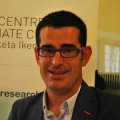
Ibon Galarraga Gallastegui
BC3, Basque Centre for Climate Change, Senior Researcher
BC3 Basque Centre for Climate Change Ph.D. in Economics (Environmental Economics) from the University of Bath (UK), M.A. Economics at the University of Essex (UK) and B.A. Economics (speciality of International Economics and Development) at the University of Basque Country. He has worked as an environmental consultant for many years for both public and private clients such as the World Bank, the Department for International Development of the British Government or the Basque Government. He was co-founder of a consultancy company. Ibon taught microeconomics and macroeconomics at the University of Bath and Economic Policy at the University of Deusto.
Reinhold Leinfelder is Full Professor, chair of Invertebrate Palaeontology and Geobiology at the Freie Universität Berlin and Head of the Working Group on Geobiology and Anthropocene Research. He is Principal Investigator at the Excellence-Cluster "Interdisciplinary Laboratory Image Knowledge Gestaltung".
Pedro Linares, es Profesor Propio (equivalente a Catedrático) del Departamento de Organización Industrial de la Escuela Técnica Superior de Ingeniería ICAI, director de la Cátedra BP de Energía y Sostenibilidad, y co-fundador y director de Economics for Energy. Asimismo, Pedro es investigador del Instituto de Investigación Tecnológica (IIT) e Investigador Asociado en MIT CEEPR y en EPRG, Cambridge U. Actualmente sirve como Director de la Escuela Internacional de Doctorado de la Universidad Pontificia Comillas.Dedica la mayoría de su investigación a estudiar la relación entre la energía, la economía y el medio ambiente, y en particular las políticas energéticas sostenibles, la eficiencia energética, y los modelos energéticos; pero también le interesan la toma de decisiones (sobre todo los métodos de decisión multicriterio), la justicia social, la política universitaria, y algunas más.
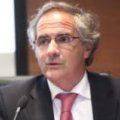
Iñigo Losada
IH Cantabria and IPCC, Director
Iñigo Losada is the Research Director at IH Cantabria. He has also been Director of the Department of Water and Environmental Sciences and Techniques (2000-2003) and is Professor of Hydraulic Engineering at the Faculty of Civil Engineering of the University of Cantabria. He holds a Doctorate in Civil Engineering from the University of Cantabria and a PhD in Civil Engineering from the University of Delaware (USA) where he worked as a researcher at the Center for Applied Coastal Research from 1989 to 1992. Iñigo has been lead researcher in projects within the Spanish National Plan, the European Union and other international research agencies. He has also led over 50 transfer projects for the United Nations, the Inter-American Development Bank, the Council of Europe and several national and international companies and public administrations. He is lead researcher of the Unique Scientific and Technological Infrastructure “Cantabria Coastal and Ocean Basin”.

Anil Markandya
Marc Neumann is Ikerbasque Research Professor and Ramón y Cajal Fellow at the Basque Centre for Climate Change (BC3). Marc holds a doctorate in Environmental Engineering from ETH Zurich (2007). He was Postdoctoral Fellow at Eawag (Swiss Federal Institute of Aquatic Sciences and Technology) and at University Laval with the Canada Research Chair on Water Quality Modelling. His research background is in mathematical modelling of urban water systems. Current research focuses on uncertainty analysis for i) the development of planning strategies for infrastructure systems under dynamics of long-term change, and ii) environmental modelling for climate change mitigation and adaptation with a focus on uncertainty- and sensitivity analysis.
Reinhard Mechler has more than 15 years of experience working on the economics of disaster risk and resilience, risk modeling and climate change. He currently is deputy director of the Risk and Resilience (RISK) research program at the International Institute for Applied Systems Analysis (IIASA). He is also a visiting professor at the University of Graz, as well as a senior lecturer at the University for Economics and Business in Vienna. His research interests comprise catastrophe risk modeling, understanding the nexus between extreme events, climate change and development, the role of resilience in disaster risk management, innovative risk financing mechanisms for sharing disaster risks, and policy instruments for climate mitigation and adaptation. He acted as a lead author on the IPCC’s special report on adaptation to extreme events (SREX) and on the IPCC’s 5th assessment report (working group II).
Peter Wadhams ScD (born 14 May 1948), is professor of Ocean Physics, and Head of the Polar Ocean Physics Group in the Department of Applied Mathematics and Theoretical Physics, University of Cambridge. He is best known for his work on sea ice. He is the president of the International Association for the Physical Sciences of the Oceans Commission on Sea Ice and Coordinator for the International Programme for Antarctic Buoys. Wadhams has been the leader of 40 polar field expeditions. Wadhams advocates for the use of climate engineering to mitigate climate change. Notable awards of Prof. Peter Wadhams – 1977 W. S. Bruce Medal for his oceanographic investigations, especially in studying the behaviour of pack ice near Spitsbergen, the North Pole and off east Greenland. [3] – 1987 Polar Medal.

Gonzalo Saenz de Miera
Iberdrola, Director de Cambio Climático
Gonzalo Sáenz de Miera es Doctor en Economía Aplicada por la UAM - Es Director de Cambio Climático y Alianzas de Iberdrola, - Vicepresidente de la Asociación Española de Economía de la Energía - Vicepresidente del Grupo Español de Crecimiento Verde - Director del MBA en Energy Business en Enerclub - Es un experto en los campos de la energía, la economía y el cambio climático y el medio ambiente.
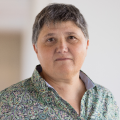
María José Sanz Sanchez
Maria José Sanz es una eco-fisióloga experta en contaminación atmosférica, cambio climático, y ciclos del nitrógeno y del carbono. Trabaja en investigación y políticas sobre cambio climático a nivel nacional e internacional. Ha publicado más de 150 artículos científicos y es reconocida como experta en temas de uso de la tierra y cambio climático (Banco Mundial, FAO, Comisión Europea, gobiernos de España, Japón, Estados Unidos, entre otros). Ha sido miembro del Grupo Intergubernamental de Expertos sobre el Cambio Climático, que recibió el Premio Nobel de la Paz 2007. Ha sido profesora asociada en la Universidad de Valencia, Investigadora Senior y Directora de Programa en el Centro Mediterráneo de Estudios Ambientales (CEAM), Senior Officer y líder de grupo en el Secretariado de la Convención Marco de Cambio Climático de las Naciones Unidas, Directora Científica del l2C2 en Zaragoza, Directora del Programa ONU-REDD en la FAO y actualmente es Directora Científica del BC3.
Precios matrícula
| REGISTRATION | Hasta 30-04-2017 | Hasta 31-05-2017 | Hasta 03-07-2017 |
|---|---|---|---|
| 95,00 EUR | 125,00 EUR | 150,00 EUR | |
| 0 EUR | 0 EUR | 0 EUR |
Lugar
Palacio Miramar
Pº de Miraconcha nº 48. Donostia / San Sebastián
Gipuzkoa
Palacio Miramar
Pº de Miraconcha nº 48. Donostia / San Sebastián
Gipuzkoa
